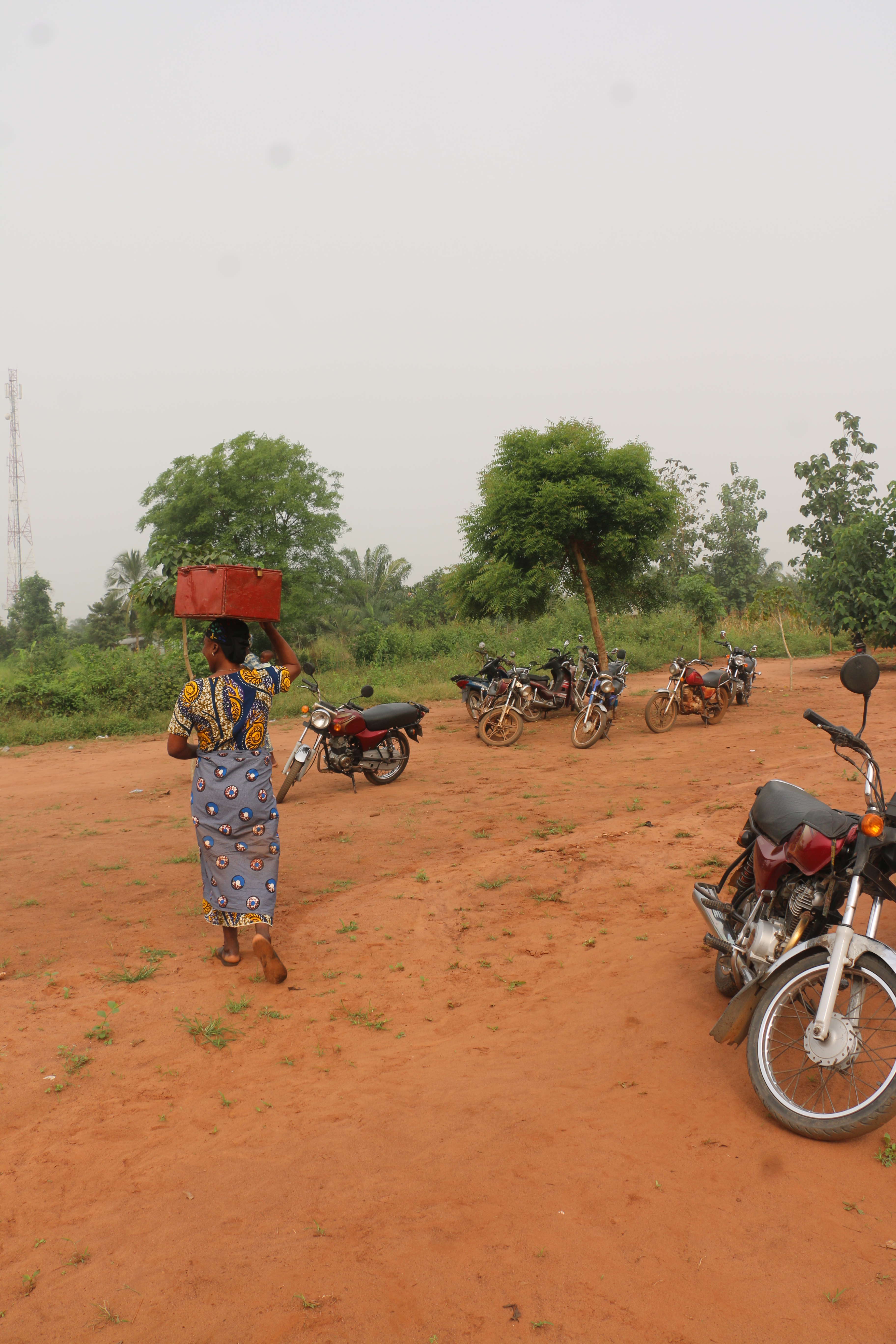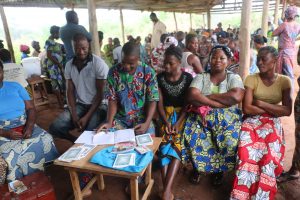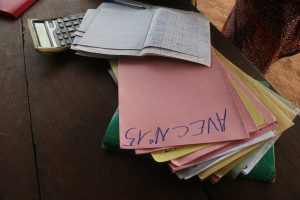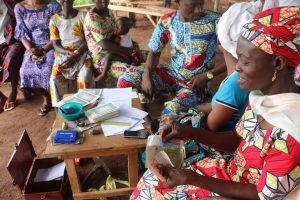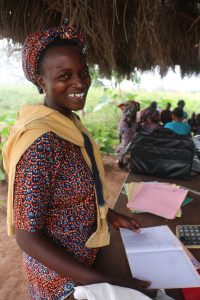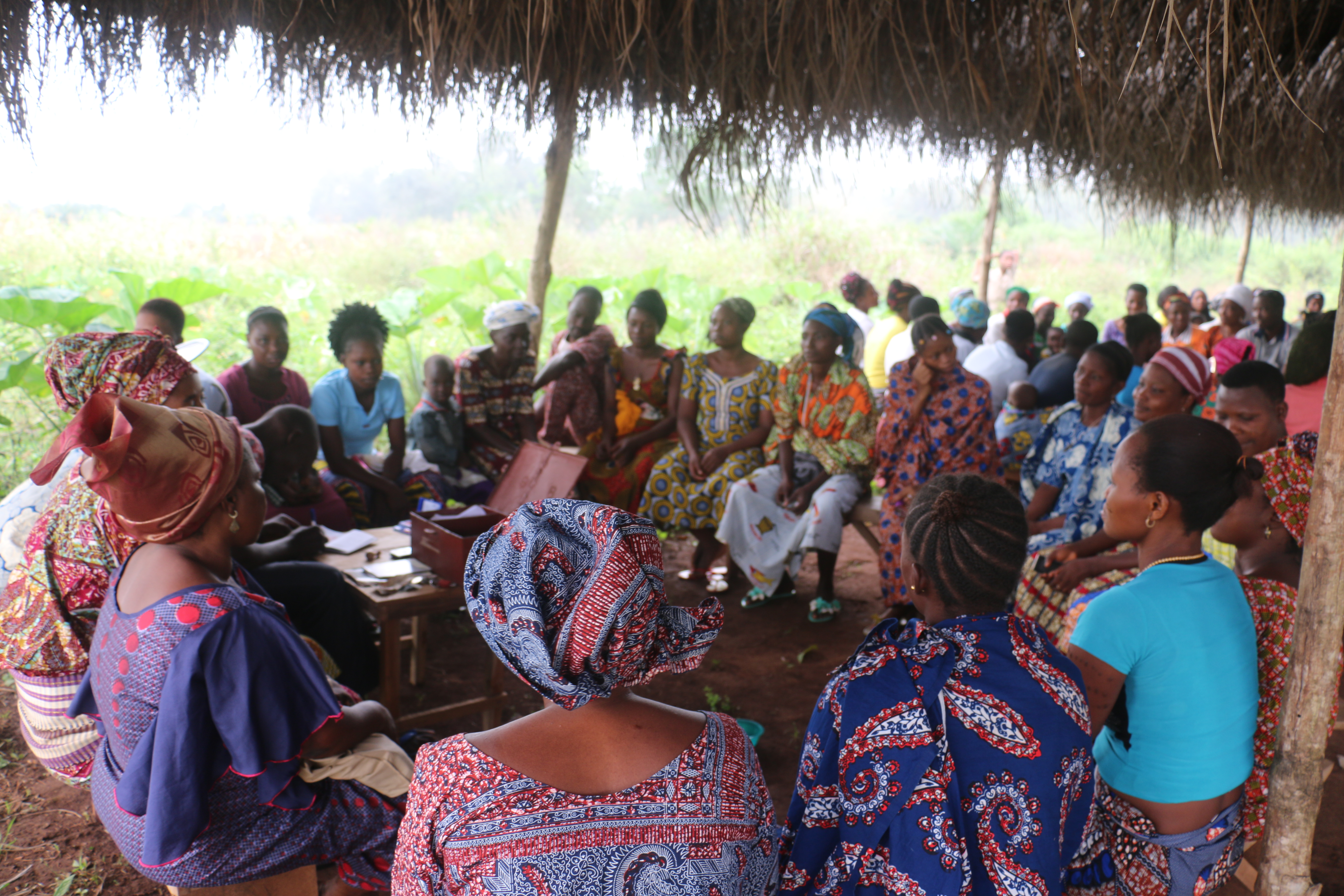 A few days before Christmas I touched base with Robin Colombin over a Facebook messenger phone call. Robin (BS ’16, international business, minor in fine art) is stationed with the Peace Corps in rural Benin and traveled two hours to the capital, Cotonou, to make this call.
A few days before Christmas I touched base with Robin Colombin over a Facebook messenger phone call. Robin (BS ’16, international business, minor in fine art) is stationed with the Peace Corps in rural Benin and traveled two hours to the capital, Cotonou, to make this call.When I caught up with Robin, she was teeming with enthusiasm for her work and loads of new international economics and business vocabulary. French is the official language of Benin, so our conversation was marked by the vacillations and pauses that develop when communicating ideas and concepts across multiple languages and cultures. Colombin, who studied French at DU, traveled abroad her junior year to Aix-in-Provence in southern France.
DU Alumni: Tell me about your time at DU. How did you get here, what did you study, etc.?
Colombin: I was really interested in marketing and was impressed with Daniel’s College of Business when I came to visit. I graduated with a bachelor’s in international business from Korbel and Daniels. I took some first year classes in international politics and economics and I fell in love. I was especially inspired by Professor Robert Uttero. It was through my class work and work study position in the humanitarian assistance graduate program that I became interested in humanitarian aid. I took a lot of Korbel classes and knew that if I wanted to do it seriously, I also wanted to have an idea of what it is like on the ground, which led me to the Peace Corps.
DU Alumni: How did you choose Benin? What was that like?
Colombin: With the Peace Corps, you pick your top three placement choices, much like the study abroad program at DU. You could always choose “Wherever I’m Needed” as an option and roll the dice, or you can choose a specific region or country. I chose Benin as my first choice. It was the only country that had an opening for a Community Economic Development Advisor in a Francophone country, which were two of my requirements.
DU Alumni: What was the process like?
Colombin: A lot of paperwork and medical tests. I had to wait a few months to hear back. I graduated in March 2016 and I heard back from Peace Corps right after graduation, but I didn’t leave for Benin until September, six months later. It’s a bit of a leap of faith—you don’t know a lot when you are accepted. I knew I’d be doing community economic development because I had applied particularly for that, but the descriptions are very generic. You might be working with various organizations—women’s groups, savings groups, NGOs, etc.
When I got to Benin, I first traveled to Lokossa, which is in the South of the country for training. I was living with a host family and I had training every day for three months. After two months, they told me where my permanent post was and who I would be working with. I was told that I would be going to Agon, Benin. At that point, I got to visit the village for two weeks and meet the people I’d be working with.
DU Alumni: What is your life in Agon like?
Colombin: I’m the only American and non-local in the community. There are about 2,000 people living here and it’s largely an agricultural economy. Most people are farming corn, cassava, pineapples, palm trees, and local vegetables.
Colombin: I’m the only American and non-local in the community. There are about 2,000 people living here and it’s largely an agricultural economy. Most people are farming corn, cassava, pineapples, palm trees, and local vegetables.
I personally really like being in a smaller community where most people know me, but it is a lot like living in a fishbowl. Everyone has been so understanding and supportive here, and it’s been amazing working with them.
DU Alumni: How did you end up in Agon as opposed to another city in Benin?
Colombin: Each volunteer gets requested by someone in the community – that person becomes your counterpart. My counterpart is Delphin Sessou–he’s been working for over 10 years to get savings and loans groups started – there were 10 in place when I got here. They have been growing, too. We teach community members the structure, how to manage them and oversee the accounting. While we provide overall management of groups, each group has its own self-elected managerial structure.
DU Alumni: What is a savings and loans group?
Colombin: Savings and loans groups go by a few different names and acronyms. In French they are called AVEC (L’association villageoise d’épargne et de crédit) and the English translation is VSLA (village savings and loans association). The need for AVEC comes from a gap between banking and microfinance. There are not a lot of banks nearby, especially in small villages, so it’s not easy to do banking. The goal of AVEC is to help the most vulnerable people, particularly women, save and loan money to each other when access to a bank is not possible, or individuals are not comfortable doing business with banks. Big banks can be intimidating. Many people can’t read or write and the documents are in French. Quite simply, some people just don’t see the value in having a savings account either.
Colombin: Savings and loans groups go by a few different names and acronyms. In French they are called AVEC (L’association villageoise d’épargne et de crédit) and the English translation is VSLA (village savings and loans association). The need for AVEC comes from a gap between banking and microfinance. There are not a lot of banks nearby, especially in small villages, so it’s not easy to do banking. The goal of AVEC is to help the most vulnerable people, particularly women, save and loan money to each other when access to a bank is not possible, or individuals are not comfortable doing business with banks. Big banks can be intimidating. Many people can’t read or write and the documents are in French. Quite simply, some people just don’t see the value in having a savings account either.
DU Alumni: So, how does the AVEC work?
Colombin: Each AVEC has its own rules, but generally speaking, members agree to contribute a small amount of money to the savings group each week. The group then makes loans from their combined savings. Individuals pay interest on their loans and pre-decided fees (fees for coming late to meetings, reimbursing loans late, etc.). At the end of the year, the interest and fees are divided based on savings and paid out to the individual members. So after a year, members get their total savings back plus interest.
Colombin: Each AVEC has its own rules, but generally speaking, members agree to contribute a small amount of money to the savings group each week. The group then makes loans from their combined savings. Individuals pay interest on their loans and pre-decided fees (fees for coming late to meetings, reimbursing loans late, etc.). At the end of the year, the interest and fees are divided based on savings and paid out to the individual members. So after a year, members get their total savings back plus interest.
AVEC serves as a money-management tool as well as an easy way for people to invest and take out loans. There is also an insurance element to the structure. Individuals pay a small amount into an emergency fund that individuals can access for urgent cases—medicine, funeral expenses, etc. It is an amazing structure to financially empower those who need it most.
DU Alumni: You said that the AVECs are growing. Can you tell us about the growth you’ve seen?
Colombin: When I arrived there were 10 AVECs. About a year later, we have 15 groups made up of 450 people. They are also opening new AVECS in other nearby villages where there is demand. For now, the groups meet under a tiny, flood-prone shelter, essentially a dirt floor covered by palm fronds. When it rains, the meeting space floods. Also, the palm fronds need to be replaced, and there is not nearly enough room for everyone so some groups meet under nearby trees.
They have made a lot of progress as far as building their own organizational infrastructure goes; now they need a permanent building structure. They have a project to build an Integrated Business Development Center where the groups can meet and store documents. They will hold free business classes there, and two rooms will be left open for any entrepreneurs in need of the space to use—that includes agricultural groups and women’s groups. Agon does not have a community center of any kind, so everyone is very excited about having this open community space. We would love your help (see link)!
DU Alumni: So, we like to ask alumni a few questions to connect with current students and with their fellow alumni. What advice do you have for a first or second year students who are just getting started at DU?
Colombin: I recommend taking classes that sound interesting to you; the best thing you can do is figure out what you are most passionate about and dive in. I came out with an entirely different degree than I thought I would.
DU Alumni: What professional or life advice do you have for fellow alumni or students who are about to graduate and launch their careers?
Colombin: Apply for things you don’t feel qualified for. Once you have the position, work hard to be over-qualified for it. That is how you’ll grow.
Robin Colombin (’16) is a Peace Corps Volunteer in Agon, Benin. In addition to serving the community on economic development projects, she is helping to raise funds for the Integrated Business Development Center. Wondering how you can help? Click to learn more about the project and donate.
